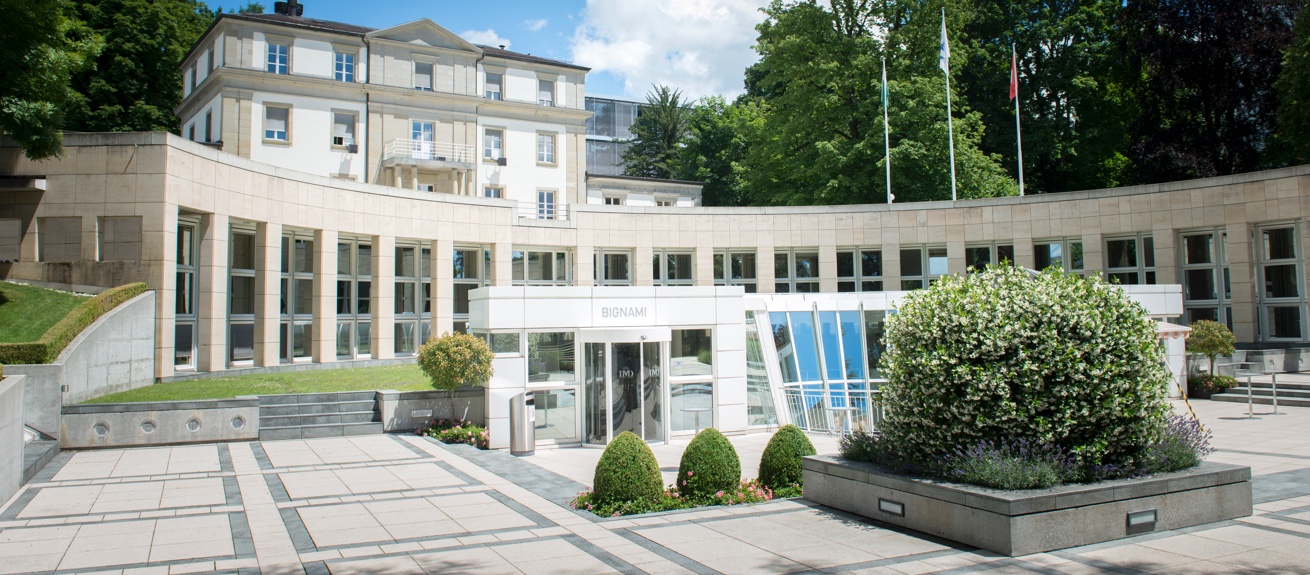
 IMD recently welcomed former Swiss Federal Councilor and President Micheline Calmy-Rey to an event organized by the IMD Lausanne Alumni Club. She shared insights on Switzerland’s current challenges, her career and vision of the future of Swiss foreign policy as well as Swiss/EU relations.
IMD recently welcomed former Swiss Federal Councilor and President Micheline Calmy-Rey to an event organized by the IMD Lausanne Alumni Club. She shared insights on Switzerland’s current challenges, her career and vision of the future of Swiss foreign policy as well as Swiss/EU relations.
Some highlights from her career: She began her term as Federal Councilor in 2002 and retired in 2011. She showed great persistence in strengthening Swiss relations with the European Union through bilateral agreements. Ms. Calmy-Rey worked to increase Swiss influence further abroad, notably in Asia, where she was able to build on Swiss neutrality to promote peace, human rights, and poverty reduction. Among her additional achievements, were her contributions to the founding of the Human Rights Council, the independence of Kosovo as well as negotiations between Armenia and Turkey, and Georgia and Russia.
Global governance
Following her introduction by IMD’s incoming President Jean-François Manzoni, Ms. Calmy-Rey opened by saying “I’ve seen the world change,” reflecting on how the world has shifted from being dominated by Europe to becoming multipolar. She stressed the increasing importance of global governance to tackle issues such as migration and climate change. “These are global challenges that we have to face together,” she said.
US election and Brexit
Discussing the recent surprise votes in the US and UK, she said that these deep and troubling trends are also “votes against globalization and the inequality it has generated”. On the election of Donald Trump, she said: “We should have known,” pointing out that his campaign was able to take advantage of the fears of the so-called losers of globalization.
Asked about Hillary Clinton, Ms. Calmy-Rey responded that she was too closely associated to the establishment to win, joking that “America wasn’t ready to let a woman be commander in chief of the strongest army in the world, but a woman President in Switzerland is OK”.
Brexit’s impact on Switzerland
“A complete dissolution of all treaties between Great Britain and Europe is neither foreseeable nor realistic because the EU itself would lose power and attractiveness,” said Ms. Calmy-Rey.
“But the British have the same problem as Switzerland; they have to negotiate access to the European market.” In this context, it is not in Switzerland’s interest to hurry, she said recommending a “wait and see” approach to observe what the UK does before reacting. “Maybe it will be thanks to them that we can continue concluding bilateral agreements.”
Bilateral negotiations
Micheline Calmy-Rey praised Switzerland as being a moderately important economic power that has managed to shoot to the top of international rankings and has been able to successfully navigate international turbulence.
Asked how to explain the Switzerland’s historic resistance to joining the EU, she said: “It’s linked to something very emotional which touches upon our national identity”. But for Ms. Calmy-Rey, Switzerland has no choice but to pursue dialogue with the EU. And that’s why she said she always sought the middle route, one of compromise, during her career. Switzerland faces an ongoing dilemma according to Ms. Calmy-Rey: “What political price does Switzerland want to pay to have access to the wider European market? Should we prioritize economic interests or sovereignty?”
Is it the end for bilateral negotiations? For Ms. Calmy-Rey, the answer is “not yet” explaining that a number of issues still need to be negotiated such as reconciling the recent vote against mass immigration in 2014 and the free circulation of people agreement Switzerland has signed with the EU.
Is Switzerland a strategic partner?
Micheline Calmy-Rey evoked the real paradox that exists in the relationship between Switzerland and the EU. “How can it be that a country as open as Switzerland is so inept in its relations with the rest of the world?” Switzerland stayed out of the global governance game as long as it could only joining international political organizations very late. The country’s experience shows that: “Power is measured by the capacity of a country like Switzerland to get involved and to present itself as strategic and influential partner,” Ms. Calmy-Rey said.
Switzerland has been adept at reinvention, notably by nurturing its role as an international mediator and by contributing to solutions to major global challenges.
What about neutrality?
Sometimes seen as a weakness, it can also be a strength, according to Calmy-Rey. “The headquarters of the United Nations in Europe, in our neutral country, is becoming more and more of a hub for important international negotiations.”
She closed by citing modesty as one of the most important Swiss qualities, but reminding the crowd that “we should also be proud to be Swiss”.
Micheline Calmy-Rey was President of Switzerland in 2007 and 2011. She was President of the Council of Europe in 2010 as well as the ministerial conference of French-speaking countries in 2010 and 2011. She is currently a Visiting Professor at the University of Geneva.
Find out more about IMD’s Alumni network.


